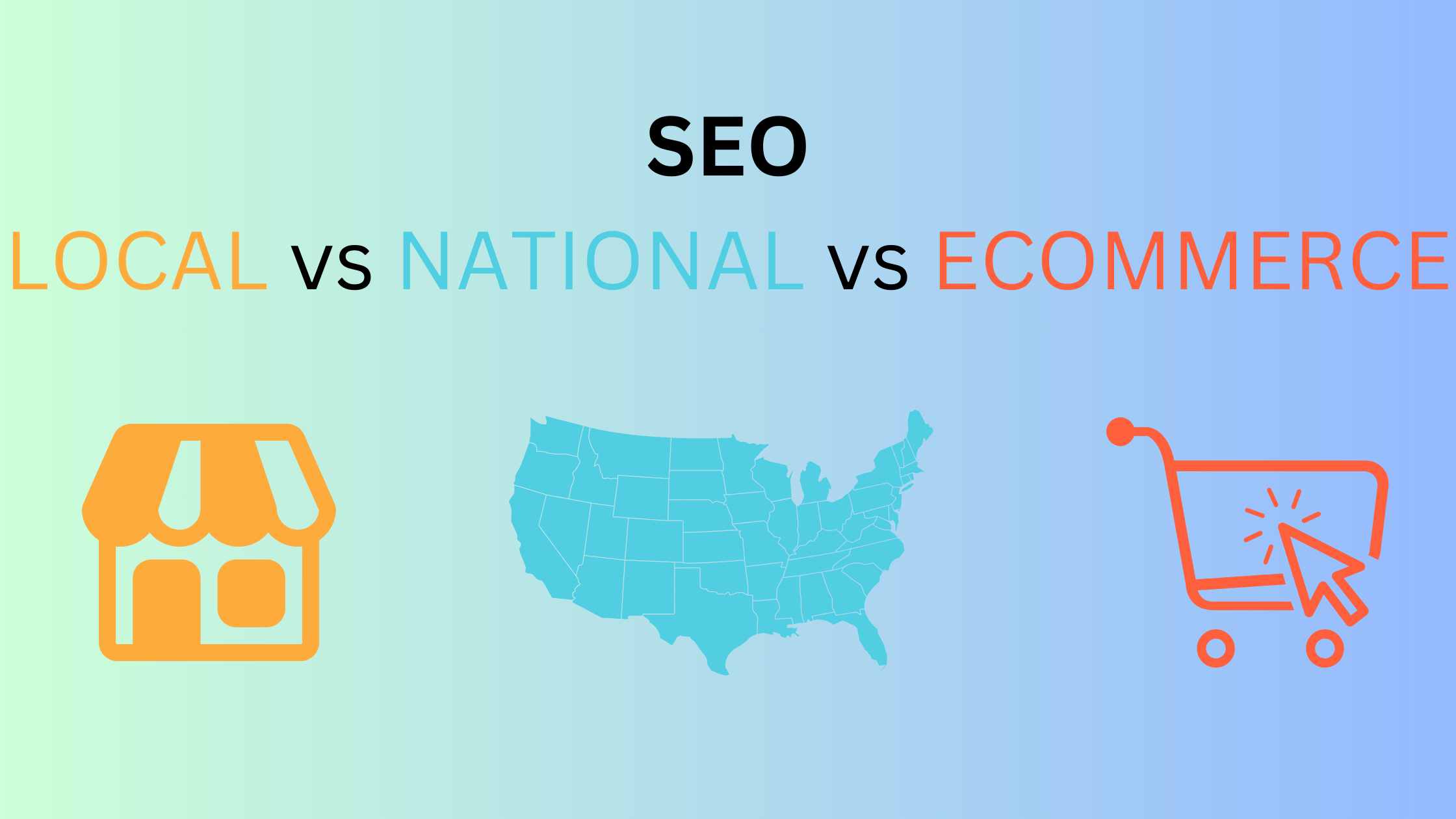If you’ve spent any time in the digital marketing world, you’ve probably heard the term SEO thrown around. It stands for Search Engine Optimization, and it’s all about making sure your business shows up when people search for the services or products you offer. But did you know there are different types of SEO depending on your business goals? Let’s break down the main three: local, national, and e-commerce SEO.
Local SEO: Getting Found in Your Neighborhood
What’s Local SEO All About?
Local SEO is like putting your business on the map—literally. It’s designed to help businesses that have a physical location or serve a specific area get found by people in that area. Think about it: if someone is searching for “best coffee shop near me,” local SEO helps your coffee shop pop up in those search results.
How to Nail Local SEO:
- Google My Business (GMB) AKA Google Business Profile: First things first, you need to claim and optimize your GMB profile. This is what gets you showing up in Google’s Local Pack (those top three businesses that pop up in a map at the top of search results). Make sure your info—address, hours, phone number—is all correct and up to date.
- Local Citations: These are mentions of your business’s name, address, and phone number (NAP) on other websites. Keeping these consistent everywhere they appear is super important for your local rankings.
- Reviews: Good reviews aren’t just nice to have—they’re a key part of local SEO. Encourage your happy customers to leave positive reviews, especially on Google. Don’t forget to respond to those reviews – both positive and negative.
- Localized Content: Creating content that speaks directly to your local audience can also boost your rankings. Blog about local events, news, or anything that ties your business to the community.
Who Should Care About Local SEO?
If your business depends on local customers—like a restaurant, dentist, or retail shop—local SEO is a must. It’s all about getting people in your area to find and choose you over the competition.
National SEO: Reaching Beyond Your Backyard
What’s National SEO?
National SEO is all about casting a wider net. Instead of focusing on a specific area, you’re trying to reach customers across the country. This type of SEO is more competitive because you’re up against businesses from all over, not just in your local area.
How to Succeed with National SEO:
- Keyword Research: You’ll need to target broader, higher-volume keywords that are relevant to your business. These keywords tend to be more competitive, so you’ll need a solid strategy to rank for them.
- On-Page SEO: This involves optimizing your website’s pages for those broad keywords. Think title tags, meta descriptions, header tags, and ensuring your content is top-notch.
- Technical SEO: Make sure your website is fast, mobile-friendly, and secure. Google pays attention to these factors, and they can make or break your rankings.
- Link Building: Getting other reputable websites to link back to your site is huge for national SEO. These backlinks tell Google that your site is trustworthy and deserves to rank higher.
Who Needs National SEO?
If your business serves customers across the country—like an online service provider, a nationwide retailer, or a company with multiple locations—national SEO is the way to go.
E-commerce SEO: Driving Online Sales
What’s E-commerce SEO?
E-commerce SEO is all about optimizing your online store so that people can find and buy your products. It’s a mix of local and national SEO tactics but with a focus on the unique needs of an e-commerce website.
How to Optimize for E-commerce SEO:
- Product Page Optimization: Each product page needs to be fully optimized with relevant keywords. This means writing unique, compelling product descriptions, using high-quality images, and ensuring your meta tags are spot on.
- Site Structure: Your site’s structure should be logical and user-friendly. Categories and subcategories should make it easy for customers (and search engines) to find what they’re looking for.
- User Experience (UX): A smooth user experience is crucial. Fast loading times, mobile optimization, and an easy checkout process are key to keeping customers on your site and getting them to convert.
- Content Marketing: Blogging, how-to guides, and videos that speak to your audience’s needs can help drive traffic to your site and boost your SEO.
Who Should Focus on E-commerce SEO?
Any online retailer looking to increase sales needs to focus on e-commerce SEO. Whether you’re a small boutique or a large online marketplace, getting your products in front of more people means more sales.
Wrapping It Up
Local, national, and e-commerce SEO each have their own strategies and benefits. Understanding these differences will help you choose the right approach for your business. Whether you’re trying to dominate the local scene, reach a national audience, or boost your online sales, there’s an SEO strategy that can help you get there.



0 Comments